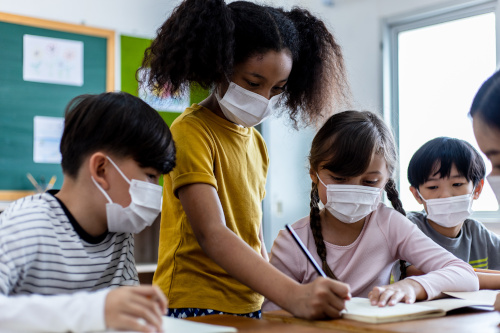Have you heard the adage, “If you don’t use it, you lose it?” If you stop playing the piano, you become a little rusty on the keys. If you stop running, you lose the muscles and lung capacity you had developed. And if you don’t use all that calculus you labored over in high school, the next time your child asks you for help on their calculus homework, you might be a little out of your league.
We’re starting to recover from the COVID-19 pandemic. Many students have been learning remotely–or may have been learning in-person, but the structure of the day was far from normal. Without a doubt, many students have lost some of their social and motor skills. If you don’t use it, you lose it, right?
What do we do to help our students regain these “educational muscles?” Here are six sure-fire ideas to re-ignite learning:
1. Teach Group Work Etiquette: Don’t assume your students remember how to have group discussions. Teach the basics of supporting one another and listening to ideas. Students will need the ground rules laid out for them on how to share ideas, collaborate, and think outside the box. Team building skills will be essential next school year. Don’t hesitate to begin lessons with activities to develop these skills for the first few weeks. Refreshing and solidifying these skills will ultimately lead to greater success in your classroom.
2. Modify Notetaking: I remember in high school and college that the first few weeks back in school were rough–for my hand. It simply was not ready to take copious amounts of notes because the muscles in my hand had degraded during the summer. After a year of remote learning, some of our students will not be physically ready to take large quantities of notes. Take that into account and ease your students back into it with group discussions interspersed by notes or demonstrations for the class.
3. Practice with Tools: From second graders using scissors and glue to tenth graders using hand tools and protractors, your students may have forgotten proper usage of their tools. Review, review, review! Take time in the lesson to explicitly teach how to use the tools as well as reiterate safety rules.
4. Lower Expectations: I know, I know. As teachers we want to raise the bar and have students meet our expectations, but in this instance, realize that the alternative learning that took place this last year had an impact on your students’ social and motor skills. Set realistic expectations for your students–in many instances, these expectations may be lower than other classes you’ve taught. It’s okay! You’ll move them to those high expectations in no time!
5. Practice Social Interactions: Build in time for students to practice social interactions.Play getting-to-know-you games, give students time to talk and interact with one another outside of academic content. While remote learning has offered them time to talk, there’s nothing like a face-to-face interaction. Students may be lacking some skills to develop new friends. Provide structured and non-structured activities for students to build new friendships and deepen previous ones.
6. Build Concentration: If your students have been learning remotely for the previous school year, they may need to strengthen their concentration skills. Take planned breaks throughout lessons, show students how to break down bigger tasks into smaller tasks, set a timer and have students focus for a specific amount of time.
Above all else, remember that you are breaking new ground. These are uncharted waters for students and teachers alike as academic and social losses are regained. You’re an educational pioneer–and you’re going to do great things!
- High school students say AI will change the workforce - April 18, 2024
- Motivating students using the Self-Determination Theory - April 17, 2024
- Michigan Virtual’s statewide workgroup releasing AI guidance for K-12 educators - April 17, 2024


